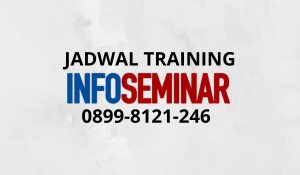Effective Team Development Using Microsoft Visual Studio Team System (Confirm Running)
Schedule
21 Mei – 23 Mei 2012
Location
Chase Plaza Building Lt. 9
Jl. Jend. Sudirman kav. 21
Investment
Rp. 4.500.000 /pax
INTRODUCTION
This three-day instructor-led course provides students with the knowledge and skills to manage source control management, a configurable build process, tools that aid in test driven development, and process workflow all integrated directly into Visual Studio 2008. By the end of the course, developers are equipped to use test-driven techniques and proven software processes to create high-quality software with a minimal change in overall effort.
Audience
This course is intended for Enterprise IT Staff who actively participate in software development projects, that is, participants in specification, design, coding, testing, or project management
At Course Completion
After completing this course, students will be able to:
- Describe integrated Application Life Cycle Management (ALM) and how Visual Studio Team System 2008 aids the ALM process.
- Identify the components of Microsoft Visual Studio Team System architecture and how these are used to improve collaboration and increase the overall efficiency of the team development process.
- Describe project management tools available in Microsoft Visual Studio Team System 2008.
- Describe the developer and architect tasks in Visual Studio Team System 2008.
- Describe MSBuild architecture and customize Team Build.
- Access version control.
- Describe Microsoft Visual Studio Team System 2008 tools used for performance and code analysis.
- Describe Web and load testing in Microsoft Visual Studio Team System 2008.
Prerequisites
Before attending this course, students must have:
- Experience and familiarity with process methodologies such as Microsoft Solutions Framework (MSF)
- Familiarity with diagramming implementations, high-level database design, distributed systems design, and business requirements analysis
- Experience in using source code versioning control tools, bug reporting, tracking, analysis tools, and possibly a unit testing suite
- Experience with Microsoft Visual Studio 2003 or Microsoft Visual Studio 2005
- Some knowledge of Visual Basic .NET or Visual C# code
Course Content
Module 1
Overview of Application Lifecycle Management Using Microsoft® Visual Studio Team System 2008
This module describes integrated Application Life-Cycle Management (ALM) and how Visual Studio Team System 2008 aids ALM.
Lessons
- Introduction to Application Lifecycle Management (ALM)
- Introduction to Team Development Features in Visual Studio Team System 2008
Lab 1: Exploring Process Guidance
Exploring Process Guidance
After completing this module, students will be able to:
- Define the key concepts of ALM.
- Describe the team development features in Visual Studio Team System 2008.
Module 2
Using Microsoft® Visual Studio Team System 2008 in a Team
This module identifies the components of the Visual Studio Team System architecture and how these are used to improve collaboration and increase the overall efficiency of the team development process. The module also describes the key client interfaces in Visual Studio Team System.
Lessons
- Introduction to Microsoft Visual Studio Team System Server Architecture
- Introduction to Microsoft Visual Studio Team System Client Tools
Lab 2: Using Microsoft Visual Studio Team System 2008 in a Team
- Creating a New Team Project
- Exploring Team Explorer
- Exploring Team System Web Access
After completing this module, students will be able to:
- Describe the Visual Studio Team System server architecture.
- Describe the features and advantages of Visual Studio Team System databases.
- Describe the Visual Studio Team System client architecture.
Module 3
Overview of Project Management Using Microsoft® Visual Studio Team System 2008
This module explains how to plan projects and use Process Guidance to customize process templates. It also describes how to track projects using work items and reports.
Lessons
- Overview of Project Planning
- Overview of Process Guidance
- Overview of Reporting in Team Foundation Server
Lab 3: Project Management Using Microsoft Visual Studio Team System 2008
- Using Work Items
- Querying Work Items
- Accessing Work Items from Microsoft Excel
After completing this module, students will be able to:
- Describe the fundamental principles of project management.
- Describe Process Guidance.
- Identify process customization features in Visual Studio Team System 2008.
- Describe the Reporting feature of Visual Studio Team System.
- Classify standard reports in Visual Studio Team System.
- Describe work item management in Visual Studio Team System 2008.
Module 4
Introduction to Design, Database, and Source Code Management Tools in Microsoft® Visual Studio Team System 2008
This module explains how to minimize the complexity of distributed software by utilizing more tools than simply code modeling. It also describes the Developer and Architect tasks of Visual Studio Team System.
Lessons
- Modeling an Architecture
- Developing Databases
- Introduction to Check-In Process
Lab 4: Introduction to Design, Database, and Source Code Management Tools
- Using the Application Designer
- Using Database Professional
- Working with Source Control
- Creating a Unit Test
After completing this module, students will be able to:
- Manage the functions of Distributed System Designers (DSD).
- Describe the check-in process.
Module 5
Using Team Build
This module explains how the build process works and how to utilize the customization and dynamic build features in Visual Studio Team System.
Lessons
- Overview of Team Build
- Configuring Team Build
- Scheduling Team Build
- Integrating Testing with Team Build
Lab 5: Using Team Build
- Creating a Team Build
- Adding Unit Tests to the Build
- Running a Local Team Build
After completing this module, students will be able to:
- Describe MSBuild architecture.
- Customize a build.
Module 6
Introduction to Version Control in Parallel Development
This module explains the key features of version control like branching, merging, locking models, differencing, and security.
Lessons
- Introduction to Parallel Development in Team Foundation
- Structuring Solutions in Team Foundation Source Code
- Overview of Source Control Cycle
- Managing Branches in Team Foundation Server
Lab 6: Introduction to Version Control in Parallel Development
- Branching Code
- Shelving Code
- Comparing Branches and Viewing the Differences
- Merging Changes between Branches
After completing this module, students will be able to:
- Describe key features of version control.
- Describe strategies for structuring solutions and projects in Visual Studio Team System.
- Describe merging strategies.
Module 7:
Introduction to Code Quality Tools
This module explains how performance analysis is done using performance tools and Performance Explorer. It also describes the quality tools which ensure the quality of the application.
Lessons
- Overview of Code Quality Tools
- Overview of Profiling Tools
- Overview of Code Analysis Tools
- Overview of Unit Testing
Lab 7: Introduction to Code Quality Tools
- Creating a Performance Session
- Running Code Analysis
- Running Unit Tests with Code Coverage
After completing this module, students will be able to:
- Describe code quality tools in Visual Studio Team System session.
- Demonstrate how to create and run profiling session
- Describe the classes in the Unit Testing Framework and how they can be used to author unit tests.
- Demonstrate how to set up code analysis for a project.
Module 8:
Overview of Web and Load Testing Using Microsoft® Visual Studio Team System 2008
This module explains how to develop, operate, and interpret results obtained from Web and load tests in Visual Studio Team System.
Lessons
- Overview of Web Tests
- Overview of Load Tests
- Interpreting Test Results
Lab 8: Exploring Web and Load Testing in Microsoft Visual Studio Team System 2008
- Creating Web Tests
- Creating Load Tests
After completing this module, students will be able to
- Describe Web test development using Visual Studio Team System 2008.
- Describe Web test execution using Visual Studio Team System 2008.
- Describe load test development using Visual Studio Team System 2008.
- Describe load test execution using Visual Studio Team System 2008.
- Describe the Visual Studio Team System 2008 tools for interpreting test results.









